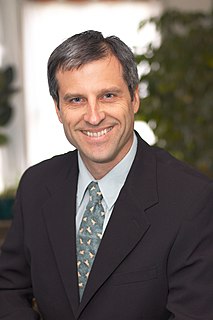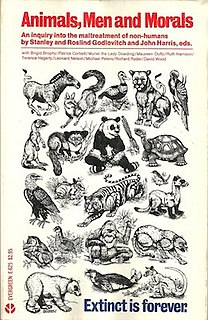Related Research Articles

Peter Albert David Singer is an Australian moral philosopher, currently the Ira W. DeCamp Professor of Bioethics at Princeton University. He specialises in applied ethics and approaches ethical issues from a secular, utilitarian perspective. He is known in particular for his book Animal Liberation (1975), in which he argues in favour of veganism, and his essay "Famine, Affluence, and Morality", in which he argues in favour of donating to help the global poor. For most of his career, he was a preference utilitarian, but he stated in The Point of View of the Universe (2014), coauthored with Katarzyna de Lazari-Radek, that he had become a hedonistic utilitarian.

Speciesism is a term used in philosophy regarding the treatment of individuals of different species. The term has several different definitions within the relevant literature. A common element of most definitions is that speciesism involves treating members of one species as morally more important than members of other species in the context of their similar interests. Some sources specifically define speciesism as discrimination or unjustified treatment based on an individual's species membership, while other sources define it as differential treatment without regard to whether the treatment is justified or not. Richard Ryder, who coined the term, defined it as "a prejudice or attitude of bias in favour of the interests of members of one's own species and against those of members of other species." Speciesism results in the belief that humans have the right to use non-human animals, which scholars say is so pervasive in the modern society. Studies increasingly suggest that people who support animal exploitation also tend to endorse racist, sexist, and other prejudicial views, which furthers the beliefs in human supremacy and group dominance to justify systems of inequality and oppression.
Veganism is the practice of abstaining from the use of animal products, particularly in diet, and an associated philosophy that rejects the commodity status of animals. An individual who follows the diet or philosophy is known as a vegan. Distinctions may be made between several categories of veganism. Dietary vegans, also known as "strict vegetarians", refrain from consuming meat, eggs, dairy products, and any other animal-derived substances. An ethical vegan is someone who not only follows a plant-based diet but extends the philosophy into other areas of their lives, opposes the use of animals for any purpose, and tries to avoid any cruelty and exploitation of all animals including humans. Another term is "environmental veganism", which refers to the avoidance of animal products on the premise that the industrial farming of animals is environmentally damaging and unsustainable.

Richard Hood Jack Dudley Ryder is an English writer, psychologist, and animal rights advocate.

Conversations regarding the ethics of eating meat are focused on whether or not it is moral to eat non-human animals. Ultimately, this is a debate that has been ongoing for millennia, and it remains one of the most prominent topics in food ethics.

Paul Shapiro is an American writer who authored the 2018 book Clean Meat: How Growing Meat Without Animals Will Revolutionize Dinner and the World. He's also the CEO and cofounder of The Better Meat Co. and the host of the Business for Good Podcast. He has delivered four TEDx talks relating to sustainable food and animal welfare. Prior to publishing Clean Meat, he was known for being an animal protection advocate, both as the founder of Animal Outlook and a Vice President at the Humane Society of the United States (HSUS).

Gene Baur, formerly known as Gene Bauston, is an author and activist in the animal rights and food movement. He’s been called the "conscience of the food movement" by Time magazine, and opposes factory farming and advocates for what he believes would be a more just and respectful food system. Baur is president and co-founder of Farm Sanctuary, a farm animal protection organization. He is vegan and has been involved with animal rights since he co-founded Farm Sanctuary in 1986. Baur has authored two books and various articles.

Jon Linden Wynne-Tyson was an English author, publisher, Quaker, activist and pacifist, who founded Centaur Press in 1954. He ran Centaur Press from his home in Sussex and was a distinguished independent publisher. He authored books on animal rights and vegetarianism. At one time Wynne-Tyson held the title of "King of Redonda", a literary title referencing a small island.
Considering animals to be a part of human moral frameworks has a long history and can be traced in many parts of the world from ancient times. By contrast, the concept of moral rights for animals in a narrower Western philosophical sense, or of legal rights for animals, is predominantly a development of recent times.
Matthew Michael Ball is an American animal activist. He is co-founder and President of One Step for Animals.

Eating Animals is the third book by the American novelist Jonathan Safran Foer, published in 2009. A New York Times best-seller, Eating Animals provides a dense discussion of what it means to eat animals in an industrialized world. It was written in close collaboration with Farm Forward, a US nonprofit organization promoting veganism and sustainable agriculture.

Animals, Men and Morals: An Inquiry into the Maltreatment of Non-humans (1971) is a collection of essays on animal rights, edited by Oxford philosophers Stanley and Roslind Godlovitch, both from Canada, and John Harris from the UK. The editors were members of the Oxford Group, a group of postgraduate philosophy students and others based at the University of Oxford from 1968, who began raising the idea of animal rights in seminars and campaigning locally against factory farming and otter hunting.
Philip John Lymbery is the Global CEO of farm animal welfare charity, Compassion in World Farming International, Visiting Professor at the University of Winchester’s Centre for Animal Welfare, President of Eurogroup for Animals, Brussels, and founding Board member of the World Federation for Animals.
Charles W. Patterson is an American author, historian, and animal rights advocate, perhaps best known for his books, Eternal Treblinka: Our Treatment of Animals and the Holocaust, Anti-Semitism: The Road to the Holocaust and Beyond, Animal Rights,The Civil Rights Movement, and Marian Anderson. He is an active member of the Authors Guild, PEN, and The National Writers Union. He follows a vegetarian lifestyle, and believes that vegetarianism can reduce violence in humans. In a protest against Columbia University's animal cruelty, Patterson returned his doctorate to the president of the university. He believed that innocent lives had greater importance than a piece of paper. Patterson is active in the Vegetarian Community, and was a guest speaker at the 2015 Veggie Pride Parade in New York City. His greatest fantasy is for all slaughterhouses to end their killing. He currently lives in the Upper West side of New York, New York.
Vegetarian ecofeminism is an activist and academic movement which states that all types of oppression are linked and must be eradicated, with a focus on including the domination of humans over nonhuman animals. Through the feminist concept known as intersectionality, it is recognized that sexism, racism, classism, and other forms of inter human discrimination are all connected. Vegetarian ecofeminism aims to include the domination of not only the environment but also of nonhuman animals to the list. Vegetarian ecofeminism is part of the academic and philosophical field of ecofeminism, which states that the ways in which the privileged dominates the oppressed should include the way humans dominate nature. A major theme within ecofeminism is the belief that there is a strong connection between the domination of women and the domination of nature, and that both must be eradicated in order to end oppression.

The relationship between Christianity and animal rights is complex, with different Christian communities coming to different conclusions about the status of animals. The topic is closely related to, but broader than, the practices of Christian vegetarians and the various Christian environmentalist movements.

Erica Meier is an animal rights advocate and was the president and executive director of Animal Outlook from 2005 to 2021.
Do Animals Have Rights? is a 2005 non-fiction book on animal rights by British philosopher Alison Hills from the University of Bristol. The book explores the ethics of factory farming, animal experimentation and other issues involving animals from a philosophical analysis.

The End of Animal Farming: How Scientists, Entrepreneurs, and Activists Are Building an Animal-Free Food System is a 2018 book by Jacy Reese that argues animal farming will end by the year 2100 based on effective altruism reasoning and social movement strategy.

Jasmin Singer is an American animal rights activist. She is the co-founder of the non-profit organization and podcast Our Hen House, serves as editor-at-large of VegNews, and is the former Vice President of Editorial at Kinder Beauty. She also supports LGBTQ+ and overlapping social justice issues.
References
- 1 2 3 4 5 6 7 "Jim Mason papers relating to Animal factories 1975-2000". New York Public Library. Retrieved March 22, 2020.
- ↑ Albala, Ken. (2015). The SAGE Encyclopedia of Food Issues, Volume 1. SAGE Publishing. p. 431. ISBN 978-1-4522-4301-6
- ↑ "Hall Of Fame". Animal Rights National Conference . Archived from the original on 6 February 2016. Retrieved 22 March 2020.
- ↑ "Jim Mason Interview". The Eugene Veg Education Network. Retrieved March 22, 2020.
- ↑ "Animal Factories". Kirkus Reviews . Retrieved March 22, 2020.
- ↑ "An Unnatural Order: Uncovering the Roots of Our Domination of Nature and Each Other". Publishers Weekly . Retrieved March 22, 2020.
- ↑ Davis, Karen. (2006). "UPC's Review of The Way We Eat by Peter Singer & Jim Mason". United Poultry Concerns . Retrieved March 22, 2020.
- ↑ Kalins, Dorothy. (2006). "Eat Your Vegetables". The New York Times . Retrieved March 22, 2020.